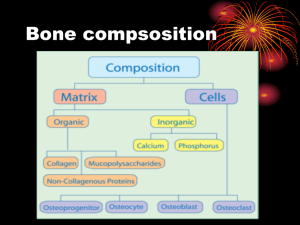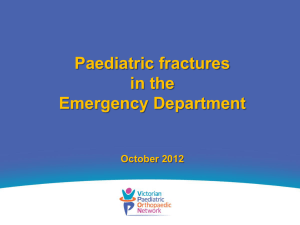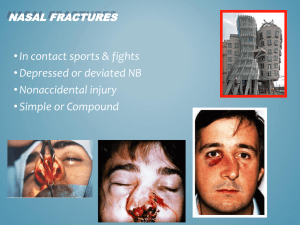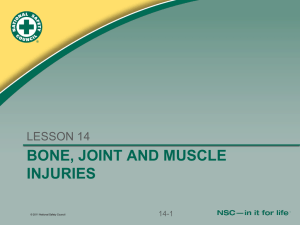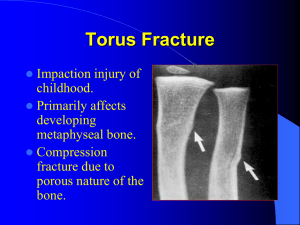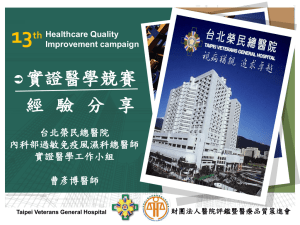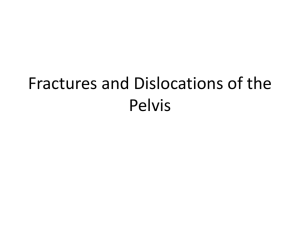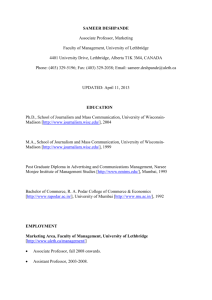Prof. Sameer Ali Bafaqeeh, M.D. ENT Consultant and
advertisement
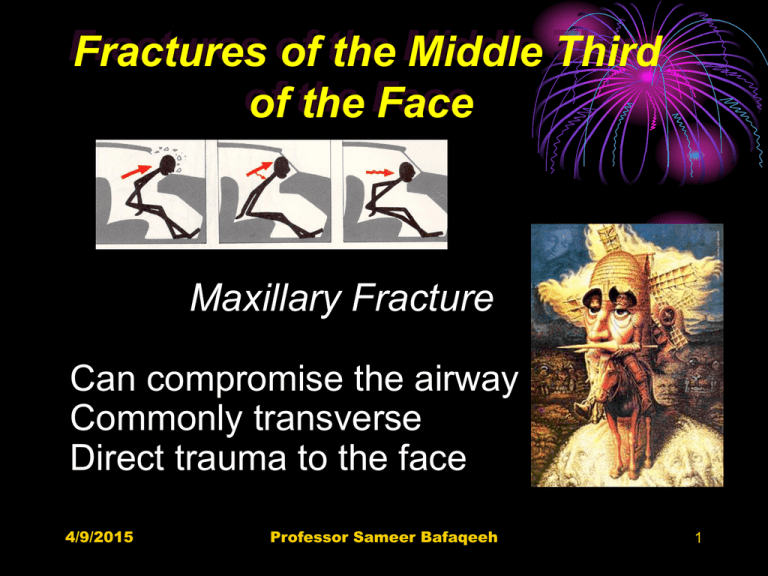
Fractures of the Middle Third of the Face Maxillary Fracture Can compromise the airway Commonly transverse Direct trauma to the face 4/9/2015 Professor Sameer Bafaqeeh 1 Le Fort Fractures System • Le Fort 1: The upper alveolus is detached • Le Fort 2: the entire upper jaw is detached • Le Fort 3: the F.S. is separated from the S.B. 4/9/2015 Professor Sameer Bafaqeeh 2 Fractures of the Middle Third of the Face • High-speed injuries (Motor vehicle accidents) • Seatbelt Laws 4/9/2015 Professor Sameer Bafaqeeh 3 Fractures of the Middle Third of the Face • Careful history &examination • Palpation around the facial structures • Jaw movements &mobility • Eye & eye movements 4/9/2015 Professor Sameer Bafaqeeh 4 Types of Central Middle Third Fracture (Le Fort Classes I ) Maxillary Fracture Clinical presentation *Le Fort Class I – Low max. horizontal fractures – # the upper alveolus – Abnormal occlusion – Hematoma or fracture of the antral wall 4/9/2015 Professor Sameer Bafaqeeh 5 Types of Central Middle Third Fracture (Le Fort Classes II ) Maxillary Fracture Clinical presentation *Le Fort Class II – Pyramid fractures – # the upper jaw – The fracture passes – Dislocation and depression – Ethmoids, orbital, lacrimal involvement – Hypertelorism 4/9/2015 Professor Sameer Bafaqeeh 6 Types of Central Middle Third Fracture (Le Fort Classes III ) *Le Fort Class III – F. Sk. and SB are separated – The fracture line: zygomaticofrontal, maxillofrontal, and nasofrontal sutures – All the structures of the central part of the facial skeleton are involved – Massive depression of the middle third of the face – Multiple fractures of the bones (dish face) – Typical symptoms (shock, concussion, cerebral contusion) 4/9/2015 Professor Sameer Bafaqeeh 7 Pathogenesis Central Middle-third Fractures # High-speed injuries • Traffic accidents • Occupational injuries 4/9/2015 Professor Sameer Bafaqeeh 8 Trauma of the Middle Third of the Face Diagnosis * History: Type, direction and force * Inspection: – Skeletal (fracture, dislocations,depression) – Symmetry of middle and frontal areas – The nose – The orbit (hematoma, movement, & vision) 4/9/2015 Professor Sameer Bafaqeeh 9 Trauma of the Middle Third of the Face Diagnosis (cont.) * Palpation: Tenderness, upper jaw, facial contour, bony skeleton, orbital rim, trismus, nose root, mandible, occlusion, teeth. * Sensory or motor innervation * CSF Rhinorrhea * Brain tissue 4/9/2015 Professor Sameer Bafaqeeh 10 Trauma of the Middle Third of the Face Diagnosis (cont.) * Radiography: – Skull radiography (Radiopaque F.B.) – Angiography – C.T. scan – Olfactometry * Maxillofacial surgeon, an ophthalmologist a neurologist, a neurosurgeon, general and orthopedic surgeon are consulted. 4/9/2015 Professor Sameer Bafaqeeh 11 NOTE: Rapid soft tissue swelling. Bloody effusion. Soft tissue injuries. 4/9/2015 } concealed concealed Skeletal assymetry or deformity Life-threatening skeletal injuries Professor Sameer Bafaqeeh 12 Treatment of Middle Third Injuries Traumatologic ABC A = Airway (the airway is secured and aspiration is prevented) B = Bleeding (must be controlled) C = Circulation (shock must be treated) 4/9/2015 Professor Sameer Bafaqeeh 13 Fracture Middle 1/3 Face • Hospitalization: Traumatologic center • Admission: Extent and type of the skull, thorax, abdomen & extremities • Patient head injury: Special traumatologic teams (A neurosurgeon, a rhinosurgeon, a maxillofacial surgeon and an ophthalmic surgeon) 4/9/2015 Professor Sameer Bafaqeeh 14 Definitive Surgery of Middle Third Fractures • Reconstitution (anatomy and function) - Debridement - Ventilation - Drainage • Rhinologic surgeon: I - Soft tissue injury, nose and sinuses II - Assessment of the base skull III- Correction of the F.Sk. and the B.O. • D.S. should be carried out quickly Fracture 4/9/2015 Formation of callus Rapidly heal in wrong position Professor Sameer Bafaqeeh 15 Fractures of the Mandible • • • • • • Maintain the airway Stop hemorrhage Intracranial or other injury Mouth deformity& malocclusion Inferior dental nerve Orthopantamogram [OPG] 4/9/2015 Professor Sameer Bafaqeeh 16 Mandible Fractures Treatment • Undisplaced fractures: Analgesia & antibiotics .A simple fracture: Intermaxillary fixation [eyelet wiring] .An irreducible fracture: Open reduction&fixation Wires or an AO Plate. 4/9/2015 Professor Sameer Bafaqeeh 17 Key Points: • 1.In orbital trauma, check the eye movements, palpate the bony orbital rim, and record visual acuity. • 2.In patients with facial injury, always check the full range of jaw mov. &determine whether or not the upper jaw is mobile. fractures of the cheek bone [ zygoma ] are often overlooked. • 3.Wear eye protection while playing racquet sports. 4/9/2015 Professor Sameer Bafaqeeh 18 Isolated Blowout Fracture – Localized violence --> Orbital contents – A blow (a fist, a tennis ball, a sq. ball, a champagn bottle cork, etc ) – Fractures of the orbital bony floor – Trapping of the orbital contents 4/9/2015 Professor Sameer Bafaqeeh 19 Blowout Fracture Symptoms – Enophthalmos – Double vision – Limitation of eye movement – Infraorbital nerve sensation disorders 4/9/2015 Professor Sameer Bafaqeeh 20 Blowout Fracture Diagnosis • Radiographs “tear drop” • Tomograms • Ophthalmologic examination 4/9/2015 Professor Sameer Bafaqeeh 21 Blowout Fracture Treatment • The antral cavity must be explored: - The bony fragments are exposed - The prolapsed part is replaced - Bridging or stabilization (Lyophilized dura, cartilage or plastic prop) • Alternative or supplementary measures: - Orbital access - Lyophilized dura, silicone sheet, or teflon - Autologous implant to correct enophthalmos 4/9/2015 Professor Sameer Bafaqeeh 22 4/9/2015 Professor Sameer Bafaqeeh 23 Nasal trauma in Childhood • Child’s nose - less promineent -more cartilaginous .Nonaccidental injury -[grotesque] .# growth centers N.deformity .Surgical correction :conservative delay .Cart. : repositioned not resected 4/9/2015 Professor Sameer Bafaqeeh 24 Mucosal injuries of the MOUTH & Pharynx [ F.B. & Trauma ] • Good healing properties • Mucosal suture in extensive injuries • Antibiotic cover 4/9/2015 Professor Sameer Bafaqeeh 25 Penetrating soft tissue injuries of the Mouth and Pharynx • Bullet, stab, and traffic accidents wounds. • Mouth and Pharynx must be assessed with related soft and bony tissues • Structures shoud be debrided, repositioned, fixed, and sutured in layers • Antibiotic • Surgical emphysema 4/9/2015 Professor Sameer Bafaqeeh 26 Impalement injuries of the Palate and posterior Pharyngeal wall • Children falling on pointed objects. • Expert examination • Suture of the wound 4/9/2015 Professor Sameer Bafaqeeh 27 Tongue Bites Heal spontaneously Penetrating bite require suture Completely divided tongue reimplanted : -the time of reconstruction -the condition of the wound -the blood supply 4/9/2015 Professor Sameer Bafaqeeh 28 Insect Bites • Swallowing a living insect [bees, etc.] . • Edema of the pharynx respiratory obstruction • I.V. high-dose steroids • Ice packs • Calcium & tracheotomy 4/9/2015 Professor Sameer Bafaqeeh 29
